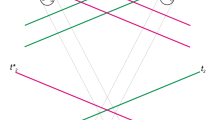Abstract
In quantum domains, the measurement (or observation) of one of a pair of complementary variables introduces an unavoidable uncertainty in the value of that variable's complement. Such uncertainties are negligible in Newtonian worlds, where observations can be made without appreciably disturbing the observed system. Hence, one would not expect that an observation of a non-quantum probabilistic outcome could affect a probability distribution over subsequently possible states, in a way that would conflict with classical probability calculations. This paper examines three problems in which observations appear to affect the probabilities and expected utilities of subsequent outcomes, in ways which may appear paradoxical. Deeper analysis of these problems reveals that the anomalies arise, not from paradox, but rather from faulty inferences drawn from the observations themselves. Thus the notion of ‘quantum’ decision theory is disparaged.
Similar content being viewed by others
References
Bar-Hillel, M.: 1989, ‘How to solve probability teasers’,Philosophy of Science,56, 348–358.
Copi, I.: 1968,Introduction to Logic, The Macmillan Company, N.Y.
Dale, A.: 1974, ‘On a problem in conditional probability’,Philosophy of Science,41, 204–206.
Faber, R.: 1976, ‘Re-encountering a counter-intuitive probability’,Philosophy of Science,43, 283–285.
Feynman, R.P., Leighton, R.B. and Sands, M.: 1963,The Feynman Lectures on Physics, Addison-Wesley Publishing Company, Reading, Mass.
Freund, J.: 1965, ‘Puzzle or paradox’,The American Statistician,19, 29–44.
Gamow, G. and Stern, M.: 1958,Puzzle-Math, The Viking Press, N.Y.
Gridgeman, N.: 1963, ‘The pit of paradox’,New Scientist,21, 462–464.
Jeffreys, H.: 1948,Theory of Probability, Oxford, Clarendon Press, 2nd edition.
Nalebuff, B.: Spring 1988, ‘Puzzles’,Journal of Economic Perspectives,2, 149–156.
Nalebuff, B.: Winter 1989, ‘Puzzles’,Journal of Economic Perspectives,3, 171–181.
Rapoport, A.: 1969,Strategy and Conscience, Schocken Books, New York, N.Y.
Rose, L.: 1972, ‘Countering a counter-intuitive probability’,Philosophy of Science,39, 523–524.
Saxon, D.S.: 1968,Elementary Quantum Mechanics, Holden-Day, Inc., San Francisco, Ca.
Schlee, E.: 1990, ‘The value of information in anticipated utility theory’,Journal of Risk and Uncertainty,3, 83–92.
Schrödinger, E.: 1947, ‘The Foundation of the Theory of Probability’,Proceedings of the Royal Irish Academy,51, 51–66.
Segal, U.: 1987, ‘The Ellsberg paradox and risk aversion: an anticipated utility approach’,International Economic Review,28, 175–202.
Seidenfeld, T.: 1979,Philosophical Problems of Statistical Inference, D. Reidel Publishing Company, Dordrecht.
Sobel, J.H.: 1992, ‘Kings and prisoners (and aces)’,Proceedings of the Philosophy of Science Association I, 203–216
Todhunter, I.: 1865,A History of the Mathematical Theory of Probability, Macmillan & Co., London.
Author information
Authors and Affiliations
Rights and permissions
About this article
Cite this article
Marinoff, L. Three pseudo-paradoxes in ‘quantum’ decision theory: Apparent effects of observation on probability and utility. Theor Decis 35, 55–73 (1993). https://doi.org/10.1007/BF01075235
Issue Date:
DOI: https://doi.org/10.1007/BF01075235




